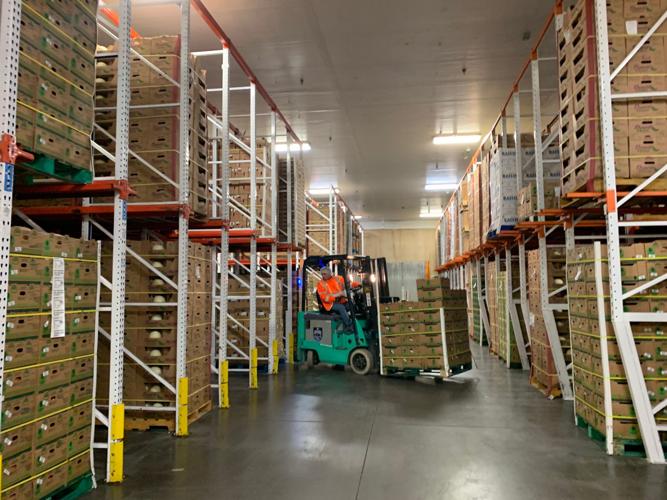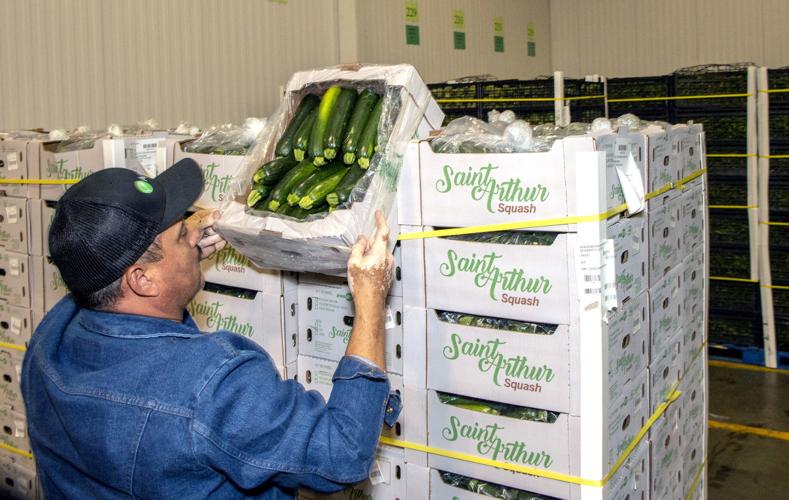Arizona stands to be the sixth-hardest-hit state in the country by President Trump’s plan to impose a 5% tariff on goods from Mexico, increasing costs to the state’s consumers by about $452 million, an analysis from the U.S. Chamber of Commerce shows.
The chamber also said if the levy goes to 25% in October, as the president has threatened, that would translate to an additional nearly $2.3 billion paid by Arizonans.
Arizona Gov. Doug Ducey, however, was unimpressed, taking a swat of sorts Monday at businesses concerned about the effects of the president’s threatened tariffs on the state and national economy.
“Well, the U.S. Chamber is going to prioritize commerce,” he said.
“That’s why they’re called the Chamber of Commerce. The Arizona governor is going to prioritize public safety.”
And Ducey said he believes it’s possible to do both.
The study by the chamber is just part of the group’s efforts to deter Trump from imposing the tariffs. The group also has said it is “exploring all options, including legal action.”
A spokesman for the chamber declined to respond Monday to Ducey’s comments.
But it isn’t just the concerns of the national chamber that Ducey is minimizing. There also are the comments of Glenn Hamer, president of the Arizona Chamber of Commerce and Industry, who late last week said the president’s announcement of an escalating system of tariffs against Mexico is “baffling and, if carried out, will be terribly damaging.”
“This will only inflict harm on the U.S. consumer,” Hamer told Capitol Media Services. And Hamer pointed out that tariffs are not paid by the foreign country or even the foreign company that is exporting the goods, but are added on to the costs for customers here.
Ducey on Monday brushed aside that threat of tariffs to the state’s Arizona financial situation.
“Our economy is roaring right now,” the governor said. “Our economy is doing terrific. Our economy is going to continue doing terrific.”
And what of the fact that tariffs are paid not by the host country but by U.S. consumers in the form of higher prices?
“There are no tariffs,” the governor said as he got into his vehicle and left.
Not yet.
Central to the issue are plans announced by Trump late last week in a Twitter post threatening to impose a 5% tariff on all imports from Mexico starting June 10 “until such time as illegal migrants coming through Mexico, and into our Country, STOP.”
He later expanded that to say the tariffs will go to 10% on July 1, 15% a month later, 20% a month after that, and finally 25% by Oct. 1.
“Tariffs will permanently remain at the 25 percent level unless and until Mexico substantially stops the illegal inflow of aliens coming through its territory,” the statement reads. And it says that the question of whether Mexico has taken the proper steps to stem the flow — and whether to end the tariffs — is “to be determined in our sole discretion and judgment.”
Ducey said that, if nothing else, there’s another benefit to tariffs in the form of media attention.
“Well, are we talking about the border again?” he asked reporters on Monday. “Good. Now let’s get something done on the border.”
And the governor insisted that, despite the number of news stories written about the flow of migrants from Central America, the issue “is not getting the focus nationally or locally in terms of what’s happening.”
His proof? The fact that there is a “humanitarian crisis, the security crisis that’s happening at the border. And there’s been no action.”
Ducey also sought to place much of the blame for the crush of migrants at the border on Congress.
He said federal officials, constrained by statutes, the number of detention facilities and how long people who seek asylum can be held, have no choice but to release migrants into local communities.
“Congress makes the law,” the governor said. “They’ve had no changes in the law.”
And Ducey sees a motive behind all that.
“They’ve used this as a political issue as if the 2020 race has already started,” he said.
And that gets back to the point of Ducey siding with the president in threatening to impose tariffs to pressure Mexico to stem the flow of refugees through that country en route to the U.S. border.
“Governors and mayors can do all they can,” Ducey said. “If you can’t see that these nonprofits are at their breaking point, then you would be calling for the same action I’m calling for.”
Ducey has found himself not only at odds with the business community on the issue of tariffs, but even among some members of his own Republican Party. That includes U.S. Sen. Martha McSally, whom the governor appointed to office.
“I do not support these types of tariffs, which will harm our economy and be passed onto Arizona small businesses and families,” she said in a statement.
And on Monday, Congressman David Schweikert said he understands the thinking of the president in trying to pressure Mexico to “lock” its southern border. But he told KTAR that tariffs are not the answer.
“With Mexico being Arizona’s No. 1 trading partner by far, it sort of becomes a double whammy on the people of Arizona,” he said. “We suffer a lot of the cost.”
Still, Schweikert said, the president’s announcement appears to have gotten the attention of Mexican officials who were reportedly headed to Washington to discuss the threat.





